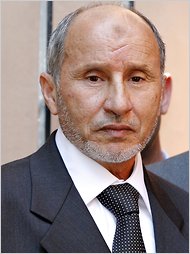By Mohamed Eljarh.

Tripoli, 12 December:
The former chairman of the National Transitional Council, Mustafa Abdul Jalil, has been ordered not to leave . . .[restrict]the country by Benghazi’s military prosecutor. The order came after Jalil was questioned over possible involvement in the murder of the General Abdul Fatah Younis who served as head of the free forces during the revolution against the Qaddafi regime.
A group of armed men killed Younis on 28 July last year. The group had an arrest warrant that was signed and authorised by the then deputy head of the NTC, Ali Essawi, and a judge named as Jumaa Al-Jazwi. The latter was assassinated on 21 July 2012 by unknown armed men outside his home in Benghazi.
Jalil was reported to be co-operating fully with the prosecutor and his office.
His questioning took place in one of the army bases in Marj, 80 kilometres north-east of Benghazi. Protesters claiming that the military prosecutor’s office included Qaddafi loyalists had surrounded the office in Benghazi and were demanding the dismissal of some of officials there.
The military prosecutor has charged Abduljalil with political irresponsibility that resulted in killing of General Younis, the abuse of authority and endangering the unity of Libyans during the revolution.
The killing of Younis came at a critical point in the Libyan revolution and it could destroyed efforts of Libyans to stand together as they fought Qaddafi’s forces. However, the Obaidat tribe, to which Younis belonged, agreed to keep take no action over the murder, promising to leave the matter in the hands of the courts.
Jalil was ordered not to travel outside Libya and to appear for the next session in court. He is effectively released on bail. The prosecutor has also ordered the presence and testimony of Mahmoud Jibril, Jalil’s prime minister at the time of the killing.
Salem Al-Mansouri, the only suspect kept in custody in the case, has claimed that that Jalil was aware of the arrest of Younis and that he authorised it after concerns and suspicions were raised about the general’s loyalty to the revolution. These suspicions were later shown to be unfounded.
The case now appears to be moving at a faster pace. There have been repeated threats by the Obaidat tribe to take matters into their own hands if the authorities failed to properly investigate matters and bring all of the parties involved to justice. [/restrict]







